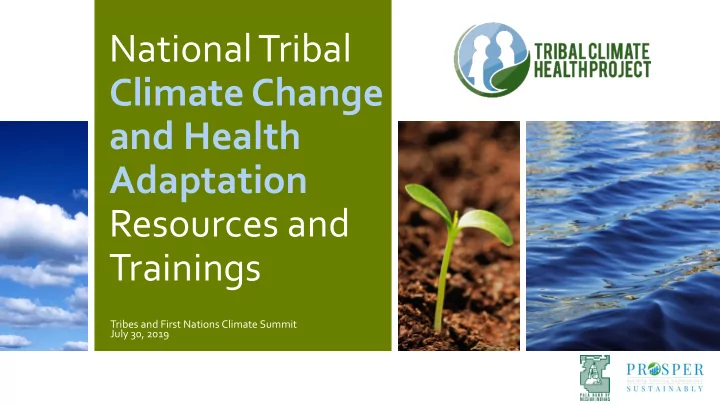

National Tribal Climate Change and Health Adaptation Resources and Trainings Tribes and First Nations Climate Summit July 30, 2019
Climate and health: an urgent matter This May: "This moment is one of extraordinary consequence. Actions taken by all nations over the next decade will determine whether global health will continue to improve or whether it will instead decline — possibly catastrophically so — as a result of climate change.“ “Health professionals can make a critical difference." 2
Pala Band of Mission Indians (Northern San Diego, CA) National collaboration and leadership on climate and health adaptation Federal funding Pala Prosper Advisory Group Sustainably Climate Ready Tribes Collaborative Climate Adaptation Capacity Building for Tribal Community Wellbeing Trainings & Assessment/ Website & Pala Intertribal companion Resource Plan/Survey Adaptation Sharing Clearinghouse tools Templates 3
Climate Change and Human Health Climate change is increasing the number of people at greater risk of human health threats such as illness, injury, death, trauma and other mental and psychosocial consequences USGCRP Climate and Health Assessment Key Findings • Increased exposure to extreme events and coastal flooding will effect health • Disruptions to essential infrastructure can limit access to healthcare and emergency response services “Our environment was rich in the wealth of natural resources, providing all our needs, allowing us to live healthy happy lives!” Puyallup Tribe 4
Climate changes wellbeing differently in different places Tribal examples: • Pacific Northwest and Great Lakes tribes : fish, food, and forests • Alaska coastal tribes : thawing, erosion and hunting • Navajo : heat and water insecurity • Mojave : shrinking river (spirituality) • Seminole Tribe of Florida : hurricanes and sea-level rise • Lakota (South Dakota): Bomb cyclone and flooding 5
What Climate Change Means for Tribes & Indigenous Peoples Unique climate-driven challenges • Each tribal community is unique • Climate change exacerbates disproportionate health outcomes • Water and food insecurity • Arctic warming • Displacement/relocating may mean loss of culture, community, sovereignty and rights • Loss of ecological health can mean loss of livelihoods • Underfunded public health services • Adaptation involves navigation of complex federal laws, treaty rights, and true engagement, consultation and consent 6
Tribal Climate Health Project Framework “ Indigenous health is based on interconnected social and Tribal Climate Health Project ecological systems that are being defines health more broadly disrupted by a changing climate. than the absence of medical disease; encompasses overall As these changes continue, the wellbeing health of individuals and communities will be uniquely • Human health: challenged by climate impacts to physical and lands, waters, foods, and other plant and animal species. These psychological impacts threaten sites, practices, and relationships with cultural, • Spiritual and spiritual, or ceremonial cultural health importance that are foundational to Indigenous peoples’ cultural heritages, identities, and physical • Socio-economic and mental health.” health Key Finding, Fourth National Climate Assessment 7
Climate changes wellbeing differently in different places Tribal example: Pala Band of Mission Indians 8
Pala Climate & Health Impacts Medium & High Risk Human Health Impacts • Heat-related stress, illness, and death • Traumatic injury or death from wildfire and storms and flooding • Mental health and psychosocial consequences associated with stress and trauma • Inability to access emergency or health services due to infrastructure and public service disruptions or failures (e.g. power, roads, communications, water treatment) • Respiratory illness due to higher levels of ozone, particulate matter (including smoke and dust), and indoor mold infestations • Decrease in fitness activity levels due to heat or unsafe outdoor conditions • Interruptions of drinking water supply • Infections due to contact with or ingestion of contaminated water • Infections due to tick or mosquito borne illness • Reduced access to affordable and nutritious food due to global crop changes • Carbon monoxide poisoning due to power outages and use of generators 9
Many Types of Professionals Can Be Involved Public Health Planning Approach Climate Adaptation Planning Emergency Management Approach Approach Community Climate Hazard Health Vulnerability Mitigation Assessment Assessment Plan Community Climate Emergency Health Adaptation Management Improvement Plan Plan Plan Initiates more plans, policies, and actions that can be complementary 1 0
TCHP Framework and Tools Based on best practices and designed to incorporate health into adaptation planning Implement Vulnerability Adaptation Plan Adopt Evaluate Assessment Update Companion Tools • Online resource clearinghouse • Input gathering templates • Exposures, Impacts, and Strategies Inventory (EISI) tool • Report templates 11
Psycho-social-spiritual Resilience Strategies • Protecting and building mental, psychological, social and spiritual wellbeing as part of efforts to adapt to growing stressors and trauma associated with climate change • Minimize need for formal mental health treatment • “Most sure -fire way to reduce the human suffering that climate change will inevitably bring” - Bob Doppelt • Promote sense of safety, calming, efficacy, hope, and connection • Literature emerging from disaster response and recovery applied to climate change Pala’s CRT project develops a framework for tribal communities 12
Pala’s Psycho-social-spiritual Resilience Strategies
Wrapping Up Key takeaways • Protect physical and psychosocial wellbeing by ensuring health is a focus in climate planning and climate is considered in health and emergency planning • Connect with your health professionals and your community • Join our growing learning community to take advantage of time-saving resources • You can find trainings, resources, tools, templates fact sheets and other information: • Tribalclimatehealth.org • ped.palatribe.com/climate-change/ • facebook.com/tribalclimatehealth/ 14
Angie Hacker Shasta Gaughen 805-234-5131 760-891-3515 ahacker@prospersustainably.com sgaughen@palatribe.com Thank You Acknowledgements • US Environmental Protection Agency • US Bureau of Indian Affairs • Members of the TCHP Advisory Group • National Indian Health Board
Recommend
More recommend